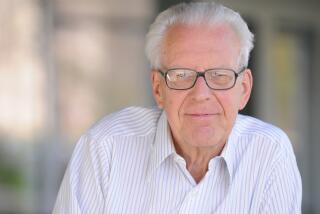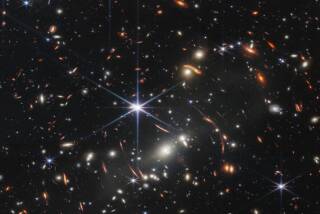The Man Who Expanded the Universe : Edwin Hubble may have been a fake in some ways, but he was always true to science : EDWIN HUBBLE: Mariner of the Nebulae, <i> By Gale E. Christianson (Farrar, Straus & Giroux: $27.50; 420 pp.)</i>
- Share via
If ever a man looked and acted in accordance with the part that history had assigned him, astronomer Edwin Hubble was that man: tall and Hollywood handsome with a dimpled chin and the pipe-smoking gaze of an English gentleman. Champion athlete, war hero, lawyer, hero of the Wild West, he had it all. He interacted with others, an awed young astronomer once said, as might a god.
Seemingly without breaking a sweat, Hubble rode into history in the 1920s the way his patriarchal grandfather had ridden on a sorrel horse with white feet and a mane that touched its knees into Springfield, Mo., in 1856. The junior Hubble’s horses were giant domed clockworks of steel and glass perched on the rugged, precarious heights of Mt. Wilson, north of Pasadena.
It was there that he described the first revolutionary hints of what we now call the expanding universe. By the 1940s, Hubble was the second most famous scientist in the world. Movie stars made pilgrimages to the telescope to see him; Hitler allegedly sent a U-boat to kill him. He was photographed with Albert Einstein. He was on the cover of Time magazine.
More books than are good for your sanity or your eyesight have been written about the big bang and the mysteries of its putative past and future. Cosmologists today travel the planet like rock stars, and when they want to have a meeting they have to hire a convention hall. In this expanding universe of publicity, it is something of a scandal that Hubble’s own story has not been adequately told until now. Hubble wanted it that way. He produced no memoir.
After his death his wife, Grace, destroyed his personal papers. All that remains are her own idolatrous journals in which she recorded the exploits he recounted. As this fascinating and heroically researched biography makes clear, however, most of those tales were made up of whole cloth.
In “Edwin Hubble: Mariner of the Nebulae,” Gale Christianson has dug through previously inaccessible archives, interviews with Hubble’s sisters, friends, relatives, and colleagues, and Grace’s eloquent and suspect journals to piece together a riveting portrait of a great scientist and a haunted man, and the best look we are likely to have of the real Hubble.
Christianson glides gracefully between the personal and the cosmic as he moves from Hubble’s rock-ribbed American boyhood on the plains of Missouri to his journeys among the stars of both the celestial and earthly variety. Along the way there is a suitably Runyonesque cast of supporting characters, from Milton Humason, mule driver and dropout who rose to become a tobacco-chewing wise-cracking astronomer, to Nicholas Copernicus, the faithful cat.
Many of the most colorful of these characters were hanging around Mt. Wilson when Hubble, a newly minted Ph.D. with nebulae in his eyes, arrived in 1919, coincidental with the opening of the 100-inch Hooker telescope, the world’s largest. The nature of the mysterious clouds known as nebulae that pocked the sky was the burning astronomical issue of the time.
Within four years, Hubble had supplied the definitive proof that one, the Andromeda nebula, was in fact a huge conglomeration of stars as large as the Milky Way and vastly far away. In the process, he humiliated his archrival Harlow Shapley, another prickly self-made Missourian, who didn’t believe that nebulae were galaxies and, given the chance to discover it, had wiped the crucial ink marks off the photo plate.
Five years later, Hubble had begun to fill in the larger picture of island universes, strewn like dust as far through space as the rapidly enlarging eyes of mankind could see, rushing enigmatically and majestically away from each other. Einstein himself, had recoiled from this notion when it popped up in his equations.
Not everyone agreed, and behind Hubble’s pipe-smoking facade was a killer competitor. With insider relish, Christianson relates vitriolic battles with other astronomers and the administrators at his observatory that sent the godlike astronomer to his bed curled with stomach pains. There was apparently a lot at stake.
Hubble’s real struggle, Christianson suggests, was with his puritanical and austere father, John, a traveling insurance agent and failed lawyer, “a man whose brief and sporadic appearances were fraught with a mixture of anticipation and dread.” His judgmental apparitions seem to have inspired in the young Edwin a hunger for recognition that not even the universe could fill.
Edwin had acquired a boyish love of the stars from his grandfather, the man on the horse, but his father demanded that Edwin be a lawyer. It was not until John died of kidney failure at the age of 52, that Edwin, reluctantly reading law as a Rhodes scholar at Oxford, was free to pursue astronomy.
By then he had begun to feed his unfortunate hunger by embellishing experiences that most mortals would feel no need to amplify. A horseback encounter with a bear during a summer job evolved into a series of tall tales involving knife fights in railroad yards, tent mates killed by trees, and heroic rides. During World War II, OSS director Wild Bill Donovan tried to recruit Hubble for a secret mission to parachute in occupied France as leader of a seven-man team that, in Grace’s telling, also included the baseball player and putative Heisenberg assassin Moe Berg.
When Hubble applied to the University of Chicago graduate school to study astronomy at long last, he said he been practicing law in Kentucky, when in fact he had been a schoolteacher and basketball coach--a lie, the author surmises, that haunted him the rest of his life. In more than 30 years of marriage, Grace was never allowed to meet any of Edwin’s relatives. Moreover, he had returned from Oxford as an ersatz Englishman, wearing knickers and capes, using phrases such as “splendid fellow” and “ripping,” to the bemusement of some and the irritation of others, particularly his rival astronomers.
Fame allowed Hubble to live his fantasies to the hilt. Much of the last half of Christianson’s narrative is devoted to descriptions of his and Grace’s lengthy tours of England and the continent, fishing on private trout streams, and lounging, in Grace’s words like a “recumbent lion,” with the Huxleys. After dinner with Charlie Chaplin, Grace penned in her journal: “We have at last met Charlie. Now whom do we want to meet?” Hubble was gone so much that observatory director Walter Adams tried to dock his salary. Such arrogance ultimately cost him the directorship of the observatory.
Christianson knows his astronomy, and he is as adept at describing the sometimes hair-raising process of steering and focusing a large telescope as he is at describing dinner parties at Hearst Castle. The book’s authoritative tone is undermined only slightly by several lapses.
Astronomers will appreciate this book for its honesty and lack of purple prose about the big bang. General readers will appreciate it for its lucidity, but those who want to know more about the implications of Hubble’s discoveries and their connection to some of the high-flying theories that abound today are likely to feel a little cheated. Christianson saves his most elegant prose for Hubble’s many trout-fishing trips: “Flowing over a chalk bottom and sharp against the dawn sky, the willow-lined Test had long been considered the Holy Grail of English troutdom.”
In that he is not unlike Hubble himself. Fortunately for science, Hubble’s phoniness ended at the telescope eyepiece. Entrusted with perhaps the most majestic discovery in the history of science, Hubble didn’t say he had seen the face, hand, or any other part of God. He never even used the phrase “expanding universe.” That was all part of the realm of speculation that he abjured.
Pressed, he once said that the universe was too much for him to understand; he didn’t do theory. And so the expanding universe grew with a dignity that would be hard to imagine today. He didn’t have NASA looking over his shoulder hoping to justify a billion-dollar procurement budget on every trip to the telescope. Hubble could lay out observing programs that would take decades to accomplish. If Hubble had to pretend to be something, an English gentleman was not a bad choice.
By the time Hubble became a great man, he had been pretending to be one for so long that he had forgotten that he didn’t have to act anymore. To Allan Sandage, a young acolyte sent to assist and ultimately succeed him, Hubble seemed a little hollow, like an actor. “Hubble had made up stories about his past. Now such stories were no longer needed; as Sandage kept reminding himself, he was apprentice to the greatest astronomer in four centuries.”
More to Read
Sign up for our Book Club newsletter
Get the latest news, events and more from the Los Angeles Times Book Club, and help us get L.A. reading and talking.
You may occasionally receive promotional content from the Los Angeles Times.








